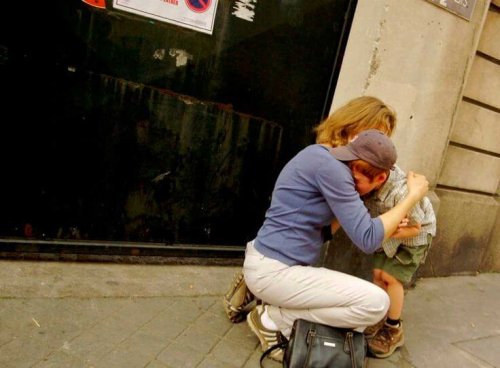Teach Your Children to Defend Themselves Against Cruelty

Some children can be very cruel to other children in certain circumstances, and even exceed any acceptable limit for no apparent reason. Therefore, in this article, we’ll tell you how to teach your children to defend themselves from other cruel children.
This is an important lesson, as bullying, which consists of physical, social, and psychological intimidation between children, is constantly increasing worldwide. In fact, 90% of students in grades 4-8 report having been harassed or bullied, 28% of students in grades 6-12 experience bullying, and 20% of students in grades 9-12 experience bullying.
This problem not only affects the child’s relationships with their peers. It also damages their self-esteem, security, and confidence. And this isn’t a minor issue. That’s why you must teach your little one not only that not all people are good, but that there are also ruthless people and those with serious emotional problems.
Of course, it’s not about producing paranoia in children, but about explaining to them that they must differentiate the type of people with whom they interact in order to get away from “toxic” individuals. In other words, those who won’t contribute anything positive to their lives, but rather disappointments, frustrations, and all kinds of problems.
Why teach your children to defend themselves from cruelty?
You’ll see that teaching your children to defend themselves from cruel children has multiple benefits. This way, you not only prepare them to avoid bullying but also teach them to deal with conflicts. Therefore, you promote their autonomy and safety.
It’s obvious that you want to always stay by their side and protect them against every danger or mishap that arises around them. But, when children grow up, they begin to claim their time and space, gaining independence and shaping their world and environment for themselves.
No matter how much you’re part of their lives, it’s essential that children know how to stand up for themselves in the face of every adversity. At the same time, they need to be able to defend themselves against cruel children and know how to make others respect them and treat them with dignity.
Tips to teach your children to defend themselves against cruelty
Teach them to avoid offenses
In each case of bullying, it’s possible to detect an initial offense or provocation. This works like bait that cruel children throw out in order to hurt, provoke, or attack children who are generally weaker.
Although it’s an unfortunately effective strategy, if the idea is to teach children to defend themselves against cruel children, show them how to avoid those offenses. This means providing them with useful and applicable tools throughout their lives.

To do so, you can apply the following strategies:
- Explain the benefits of ignoring and downplaying the cruel comments the other child makes about them. Remind them that everything the other child says is a reflection of themself. In other words, it’s only a projection.
- Provide responses that show that the offense is of no consequence and has no effect on the bullied child, or encourage them to walk away with their head high as if they don’t care about what the other child said.
- Show them that avoidance isn’t synonymous with cowardice. Rather, it’s the most useful and effective coping strategy when fighting back makes no sense.
- Ask them to ignore and avoid the cruel child. And, if they have the chance, they should get away and find safe company. This is the bravest and most sensible resource they can apply to the situation.
Equip them with strategies to control their emotions
The child’s who’s bothering your child is probably looking to feel powerful and attract attention by trying to make them angry, cry, or lose control. However, if your child gives into provocation by showing vulnerability, they may be teased frequently.
That’s why it’s advisable for little ones to try not to show their emotions in offensive situations. Of course, it’s not an easy mission and requires a lot of practice and patience. So, you can put offer a series of easy and effective strategies:
- Be patient and tolerant, count to 10, keep your face unchanged, and take deep breaths.
- Don’t encourage an eye for an eye or teach your kids to take revenge. This is because replicating cruelty transmits the wrong values. Educate with empathy in order to understand the behavior of others.
- Tell your child about the advantages of treating others as they would like to be treated. If the cruel child is treated kindly, they’ll be puzzled because they won’t understand the reaction or what’s happening.
Encourage the search for support
Another way to teach your child to defend themselves against a cruel child is to avoid facing bullying alone. as bullying makes children feel helpless, insecure, and weak. Therefore, talk with your little ones and encourage them to seek out the support and complicity of friends or schoolmates.

Let them know that asking for help or assistance from the people around them isn’t a sign of weakness. Rather, it gives them the possibility of conducting self-criticism with the consequent ability to recognize their weak points. And, of course, it helps them solve those problems they can’t solve on their own.
Prioritize communication with your child
In all cases related to childhood, a golden rule is to maintain good communication and fluid dialogue between parents and children. Even when it comes to teaching your children to defend themselves against bullies, it’s essential that they also have the help, support, and understanding of their parents.
In cases of harassment or abuse, minors tend to withdraw. Therefore, they often don’t tell anyone what happened due to the intimidation and threats exerted on them. Just the same, we must encourage our children to expressive and communicative. If they manifest what’s going on, we can help them solve the problem.
Of course, while you teach your children to defend themselves against cruelty, don’t forget under any circumstances to congratulate them every time they confide in you and express their discomfort or the feelings that have to do with being subjected to unpleasant situations.
Some children can be very cruel to other children in certain circumstances, and even exceed any acceptable limit for no apparent reason. Therefore, in this article, we’ll tell you how to teach your children to defend themselves from other cruel children.
This is an important lesson, as bullying, which consists of physical, social, and psychological intimidation between children, is constantly increasing worldwide. In fact, 90% of students in grades 4-8 report having been harassed or bullied, 28% of students in grades 6-12 experience bullying, and 20% of students in grades 9-12 experience bullying.
This problem not only affects the child’s relationships with their peers. It also damages their self-esteem, security, and confidence. And this isn’t a minor issue. That’s why you must teach your little one not only that not all people are good, but that there are also ruthless people and those with serious emotional problems.
Of course, it’s not about producing paranoia in children, but about explaining to them that they must differentiate the type of people with whom they interact in order to get away from “toxic” individuals. In other words, those who won’t contribute anything positive to their lives, but rather disappointments, frustrations, and all kinds of problems.
Why teach your children to defend themselves from cruelty?
You’ll see that teaching your children to defend themselves from cruel children has multiple benefits. This way, you not only prepare them to avoid bullying but also teach them to deal with conflicts. Therefore, you promote their autonomy and safety.
It’s obvious that you want to always stay by their side and protect them against every danger or mishap that arises around them. But, when children grow up, they begin to claim their time and space, gaining independence and shaping their world and environment for themselves.
No matter how much you’re part of their lives, it’s essential that children know how to stand up for themselves in the face of every adversity. At the same time, they need to be able to defend themselves against cruel children and know how to make others respect them and treat them with dignity.
Tips to teach your children to defend themselves against cruelty
Teach them to avoid offenses
In each case of bullying, it’s possible to detect an initial offense or provocation. This works like bait that cruel children throw out in order to hurt, provoke, or attack children who are generally weaker.
Although it’s an unfortunately effective strategy, if the idea is to teach children to defend themselves against cruel children, show them how to avoid those offenses. This means providing them with useful and applicable tools throughout their lives.

To do so, you can apply the following strategies:
- Explain the benefits of ignoring and downplaying the cruel comments the other child makes about them. Remind them that everything the other child says is a reflection of themself. In other words, it’s only a projection.
- Provide responses that show that the offense is of no consequence and has no effect on the bullied child, or encourage them to walk away with their head high as if they don’t care about what the other child said.
- Show them that avoidance isn’t synonymous with cowardice. Rather, it’s the most useful and effective coping strategy when fighting back makes no sense.
- Ask them to ignore and avoid the cruel child. And, if they have the chance, they should get away and find safe company. This is the bravest and most sensible resource they can apply to the situation.
Equip them with strategies to control their emotions
The child’s who’s bothering your child is probably looking to feel powerful and attract attention by trying to make them angry, cry, or lose control. However, if your child gives into provocation by showing vulnerability, they may be teased frequently.
That’s why it’s advisable for little ones to try not to show their emotions in offensive situations. Of course, it’s not an easy mission and requires a lot of practice and patience. So, you can put offer a series of easy and effective strategies:
- Be patient and tolerant, count to 10, keep your face unchanged, and take deep breaths.
- Don’t encourage an eye for an eye or teach your kids to take revenge. This is because replicating cruelty transmits the wrong values. Educate with empathy in order to understand the behavior of others.
- Tell your child about the advantages of treating others as they would like to be treated. If the cruel child is treated kindly, they’ll be puzzled because they won’t understand the reaction or what’s happening.
Encourage the search for support
Another way to teach your child to defend themselves against a cruel child is to avoid facing bullying alone. as bullying makes children feel helpless, insecure, and weak. Therefore, talk with your little ones and encourage them to seek out the support and complicity of friends or schoolmates.

Let them know that asking for help or assistance from the people around them isn’t a sign of weakness. Rather, it gives them the possibility of conducting self-criticism with the consequent ability to recognize their weak points. And, of course, it helps them solve those problems they can’t solve on their own.
Prioritize communication with your child
In all cases related to childhood, a golden rule is to maintain good communication and fluid dialogue between parents and children. Even when it comes to teaching your children to defend themselves against bullies, it’s essential that they also have the help, support, and understanding of their parents.
In cases of harassment or abuse, minors tend to withdraw. Therefore, they often don’t tell anyone what happened due to the intimidation and threats exerted on them. Just the same, we must encourage our children to expressive and communicative. If they manifest what’s going on, we can help them solve the problem.
Of course, while you teach your children to defend themselves against cruelty, don’t forget under any circumstances to congratulate them every time they confide in you and express their discomfort or the feelings that have to do with being subjected to unpleasant situations.
This text is provided for informational purposes only and does not replace consultation with a professional. If in doubt, consult your specialist.








